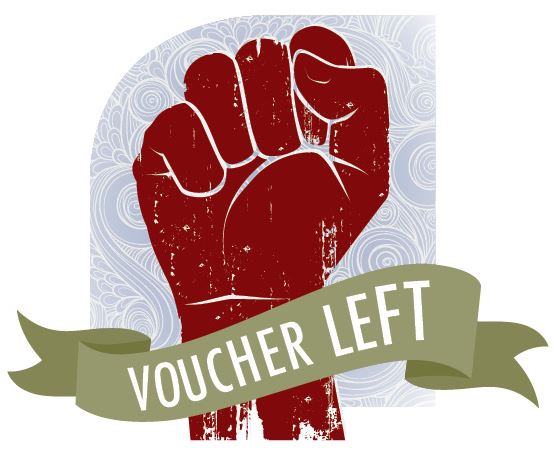
War on Poverty liberals who supported private school vouchers saw school choice as a means to create more accountability for a public education system that they saw as unresponsive to the needs of low-income parents. (Image from Wikimedia Commons.)
This is the latest post in our ongoing series on the center-left roots of school choice.
The Great Society liberals who pushed for private school vouchers in the 1960s and ‘70s were all about social justice. They saw a tool for empowering low-income parents. For promoting equity. For honoring diversity.

They also saw a means to redefine accountability.
In 1971, the U.S. Office of Economic Opportunity – the office created to lead the War on Poverty – put out this brochure explaining the “voucher experiment” that would eventually be sorta kinda conducted in California’s Alum Rock school district. (You can read the full proposal here.) The brochure notes the pathetic academic outcomes for low-income students across America, then pivots to a theory for progress through “greater accountability”:
One reason for this disparity could well be that poor parents have little opportunity to affect the type or quality of education received by their children. The poor have no means by which to make the education system more responsive to their needs and desires. More affluent parents usually can obtain a good education for their children because they can choose schools for their children to attend – either by deciding where to live or by sending the children to private schools. Poverty and residential segregation deny this choice to low-income and minority parents.
The Office of Economic Opportunity therefore has begun to seek a means to introduce greater accountability and parental control into schools in such a way that the poor would have a wider range of choices, that the schools would be encouraged to become more accountable to parents, and that the public schools would remain attractive to the more affluent. This has led to consideration of an experiment in which public education would be given directly to parents in the form of vouchers, or certificates, which the parents could then take to the school of their choice, public or nonpublic, as payment for their children’s education.
Now is a good a time to re-surface this blast from the past. Plenty of smart folks have been trying to help people understand a definition of accountability through school choice (see here, here, here and here). But truth be told, opponents of choice – and I’d put many of my media friends in that category – still haven’t heard that definition, or still don’t appreciate it, or still characterize it exclusively as an extension of free-market “ideology.” Perhaps hearing it from the left will cause some healthy cognitive dissonance. 🙂
A better grasp of accountability is especially important to us in Florida. We’ve been barraged by negative stories ever since President Trump visited an Orlando Catholic school in March 2017 and praised Florida’s scholarship programs. Many of these stories suggested, if not outright claimed, that the Florida programs lack accountability. The name of the Trump-spurred series in the Orlando Sentinel says it all: “Schools Without Rules.” (Our response here.)
But this notion of unaccountable private schools is only true if you believe in a narrow, warped view of accountability that includes regulations alone. If “accountability” means holding a state-supported program to account for results, then parental choice exercises that pressure, too.
The liberal academics behind the OEO voucher proposal clearly believed that.
Unfortunately, their hoped-for experiment never happened. Several school districts that initially expressed interest backed down. The only one that said yes, Alum Rock, did so on condition that private schools not participate. The result didn’t offer much evidence about whether vouchers – and accountability through school choice – worked.
Thankfully, the school choice programs that blossomed in recent decades do offer evidence.
The Florida Tax Credit Scholarship*, now serving 107,000 lower-income students, most of them black and Hispanic, is the largest private school choice program in America. Scholarship students were typically the lowest-performing students in their prior public schools. But now in the private schools their parents chose for them, they’re gaining, in layman’s terms, a year’s worth of knowledge in a year’s worth of time. Beyond test scores, an Urban Institute study found scholarship students enrolling in college, and earning degrees, at higher rates than like students in public schools.
The program is seeing these outcomes even though the scholarship amount is two-thirds the cost of educating a student in a Florida district school. In other words, an accountability system that gives low-income parents leeway in determining quality is getting better outcomes at lower cost.
A couple of anecdotes are instructive.
One of the schools the Orlando Sentinel used to anchor its case was Agape Christian Academy, a troubled school that did inexcusable things that led the state to bar it from scholarship programs. I think it’s a fair question – though not an easy one to answer – about whether regulators could have acted sooner, or more forcefully. But Agape parents weren’t waiting on state guidance. In the five years prior to state revocation last fall, the number of tax credit scholarship students at Agape dropped by two-thirds, from more than 200 to fewer than 70. The Sentinel didn’t mention this.
ProPublica led its dig on choice and “accountability” with the story of a charter school turned private school in Orange Park, Fla. Last summer, the school district revoked the charter for the Orange Park Performing Arts Academy after it earned its second F grade from the state. In the aftermath, the school re-emerged as a private school that could accept choice scholarships. It’s fair to ask whether charter schools deemed failures by the state should be allowed to reconstitute themselves in this way. In the meantime, though, it’s again worth noting the parent reaction. The principal said many of the 168 students would stay on using choice scholarships, but ProPublica never reported how many actually did. As of April 12, the school had 10 scholarship students.
Even more compelling data is coming from Arizona. Researcher Matt Ladner has documented how charter schools in Arizona have shut down at a brisk clip, at the same time the sector as a whole is producing extraordinary academic results. The reason: Accountability. Writes Ladner: “A key to success in the ‘Wild West’ involves educators having a relatively high degree of freedom to open schools and parents quickly administering frontier justice — either by never enrolling their children or by voting with their feet for other options.”
Despite the rich history of school choice on the left, white progressives have become its most vocal opponents, with shots at accountability now part of the arsenal. I wish they’d ask themselves: Why would low-income parents be less capable than they are of choosing the best available schools for their kids?
The War on Poverty progressives had an answer: They wouldn’t be.
* The Florida Tax Credit Scholarship is administered by nonprofits like Step Up For Students, which hosts this blog.